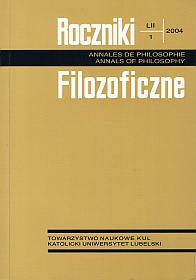From Information towards Wisdom
Abstract
The contemporary science can be defined in a cybernetic language as a self-organising system. The development of this system is guided and controlled by streams of information items produced by science. At present this development assumes more and more clearly the shape of the evolutionary variability. In its input there are data. Their united sets constitute information items which, owing to their bringing together, form the human knowledge. Integration process of the human knowledge results in the wisdom. In this way the post-industrial science has an evolutionary character coming in a form of a system “from information towards wisdom”.
It is very important to state a simple sum of data not to give any information, and as well a simple sum of information items not to give any knowledge, and then a simple sum of items which constitute knowledge not to give any wisdom. Only the process of integration causes a conversion from a lower level of cognition to its higher one. The essence of this process seems to be inspired by a creative intuition of an explorer-researcher who executes the above mentioned integration.
References
Browkin J.: Teoria ciał, Warszawa: PWN 1977.
Cempel C.: Społeczeństwo wiedzy – nowy wymiar kreowania i użytkowania wiedzy – próba sformułowania, „Nauka”, 2002, nr 3, s. 137-146.
Davis P. J., Hersh R., Marchisotto E. A.: Świat matematyki, Warszawa: PWN 20012.
Devlin K.: Żegnaj Kartezjuszu. Rozstanie z logiką w poszukiwaniu nowej kosmologii umysłu. Warszawa: Prószyński i S-ka 1999.
Findeisen W., Gutenbaum J.: Modele w analizie systemowej, [w:] Analiza systemowa – podstawy i metodologia, red. W. Findeisen, Warszawa: PWN 1985, s. 292-338.
Komorowski J.: Od liczb zespolonych, do tensorów, spinorów, algebr Liego i kwadryk, Warszawa: PWN 1978.
Koźmiński A. K.: Przemysł wiedzy, „Rzeczpospolita” z 28-29 września 2002, B3.
Krauskopf K. B.: Podstawy nauk przyrodniczych, Warszawa: WNT 1963.
Księga Mądrości. Wstęp, przekład z oryginału, komentarz, oprac. K. Romaniuk, Poznań–Warszawa: Pallottinum 1969.
Kunicki-Goldfinger W. J. H.: Szukanie możliwości. Ewolucja jako gra przypadków i ograniczeń. Warszawa: PWN 1969.
Kunicki-Goldfinger W. J. H.: Co to jest informacja i jaką rolę spełnia w kulturze jednostki i społeczeństwa, 1994 (preprint).
Lang S.: Algebra, Warszawa: PWN 1984.
Mazierski S.: Prolegomena do filozofii przyrody inspiracji arystotelesowsko-tomistycznej, Lublin: TN KUL 1969.
Nalimow W. W., Mulczenko Z. M.: Naukometria, Warszawa: WNT 1971.
Naumann F.: Vom Abakus zum Internet. Die Geschichte der Informatik, Darmstadt: Primus Verlag 2001.
Pismo Święte Starego i Nowego Testamentu. Biblia Tysiąclecia, Poznań: Pallottinum 19712.
Pogorzelski W.: O filozofii badań systemowych, Warszawa: Scholar 2002.
Rudin W.: Podstawy analizy matematycznej, Warszawa: PWN 1979.
Sigurd B.: Struktura języka. Zagadnienia i metody językoznawstwa współczesnego, Warszawa: PWN 1975.
Singh S.: Fermat’s Enigma. The Epic Quest to Solve the World’s Greatest Mathematical Problem, New York: Walker 1997.
Słownik języka polskiego, t. II: L-P, Warszawa: PWN 1979.
Słownik współczesnego języka polskiego, t. 2, Warszawa: Wilga 2000.
Such J.: Wstęp do metodologii ogólnej nauk, Poznań: UAM 19732.
Whittaker E. T., Watson G. N.: Kurs analizy współczesnej. Część pierwsza, Warszawa: PWN 1967; Część druga, Warszawa: PWN 1968.
Copyright (c) 2004 Roczniki Filozoficzne

This work is licensed under a Creative Commons Attribution-NonCommercial-NoDerivatives 4.0 International License.





